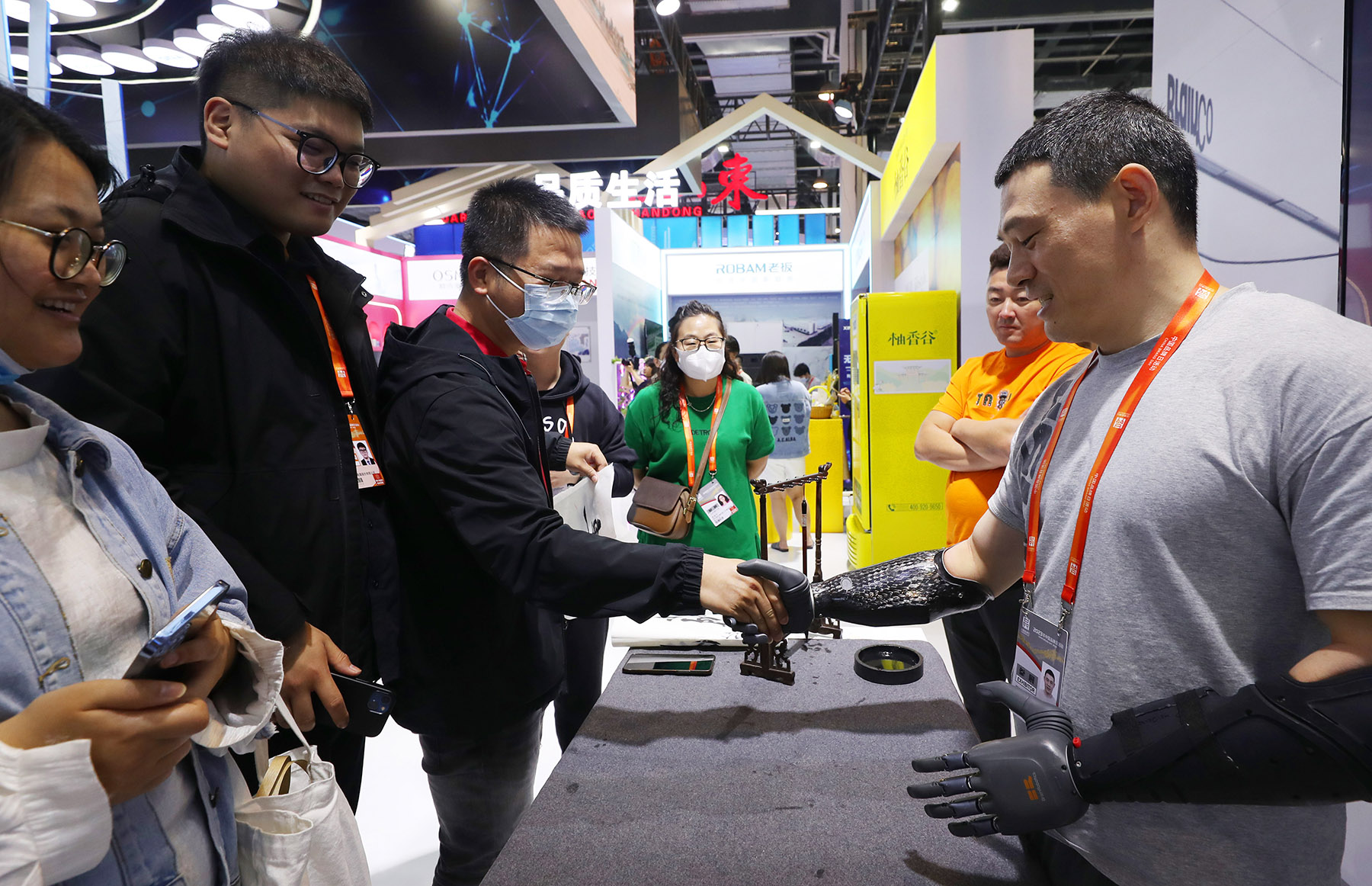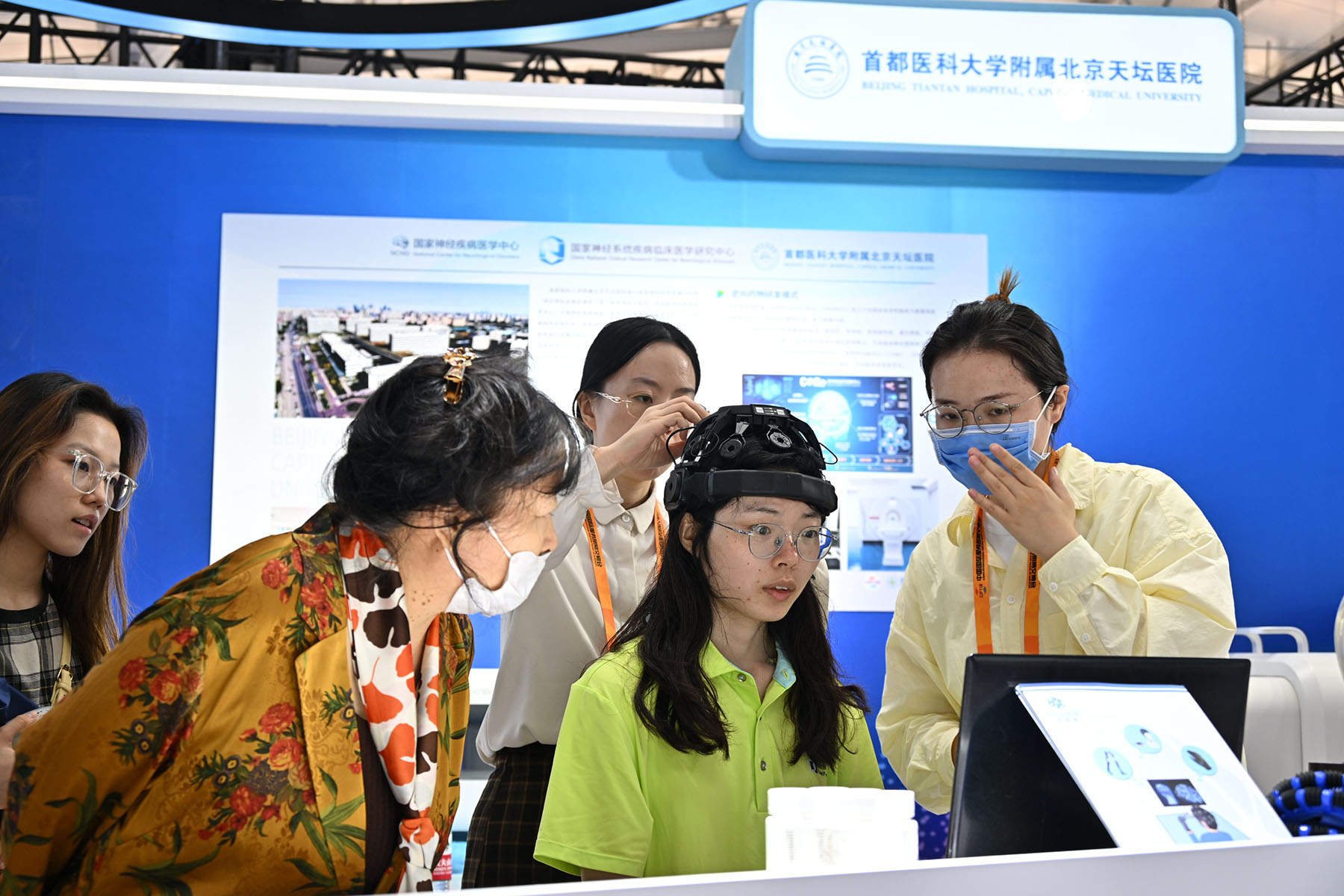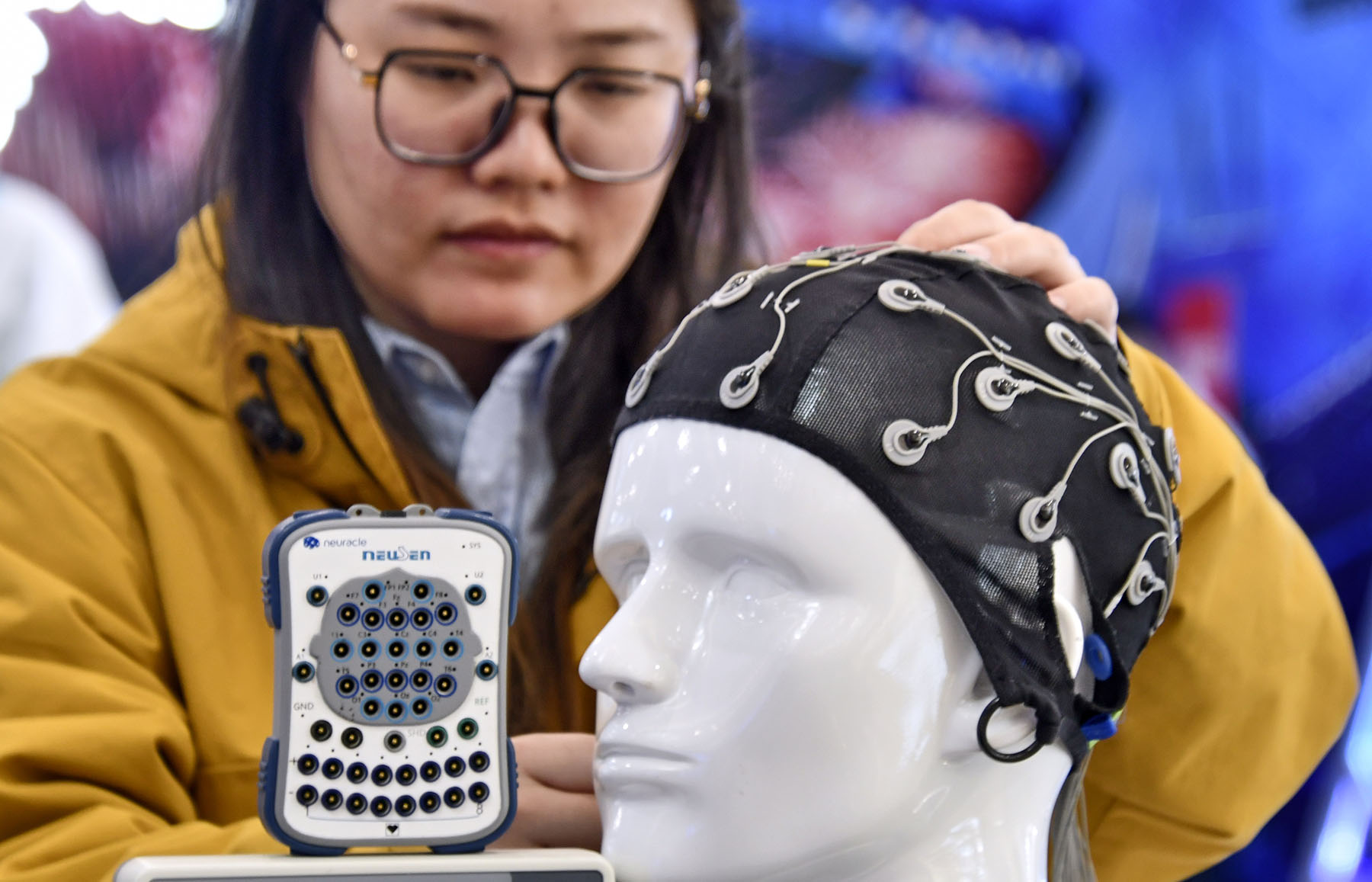China, US seek lead in emerging industry with Chinese firms wresting early edge

In Hangzhou, Zhejiang province, a 38-year-old tech firm worker, who was dealt a cruel hand by life in the form of a car accident that took both his arms, is realizing life could also create marvels, by way of high-tech — in his case, an intelligent bionic hand that breathed new life into his residual limb. Using his mind, he controls the movement of his artificial fingers, grips and dips a brush into ink and elegantly inscribes four Chinese characters on a piece of paper.
The four Chinese characters mean luck and hope — many people would agree with the techie. The brain-computer interface, or BCI, technology, which controls the brain through mind and blurs the lines between humans and machines, promises technological innovation where the mind knows no bounds.
READ MORE: Brain-computer interface tech set to surge in China
China, propelled by both the government and the private sector, is off the blocks in the global BCI race, trailing only the United States in certain segments. Chinese BCI firms are sharpening focus on both invasive and noninvasive niches of the emerging industry while the authorities concerned are seeking to get a grip on the formulation of regulatory rules.
The bionic hand was developed by BrainCo, a startup incubated at Harvard University and founded by Chinese engineer Han Bicheng. It was previously used by para-athlete Xu Jialing, the torch-bearer at the opening ceremony of the 4th Asian Para Games in Hangzhou last year.
BrainCo uses BCI technology in its bionic arm and couples it with a bracelet-like array of electrode sensors on one's arm, enabling users to use their mind to interpret electromyographic neural signals and next execute actions like clenching fists, opening palms or even giving a thumbs-up.
More than 100 Chinese companies like BrainCo are seeking to excel in the BCI industry. According to a report from the China Academy of Information and Communications Technology, a government think tank, the trend in China is similar to the one in the US.
The US and China together accounted for two-thirds of the total 500 representative BCI companies in the world as of the end of the first quarter, meaning that both countries have a "sound foundation" for leading the industry in the future, the report said.

Another report from the China Electronics Technology Standardization Institute stated that the sales revenue of the global BCI market is expected to reach $3.7 billion by 2027. By 2040, the corresponding figure for China's BCI industry is expected to exceed 120 billion yuan ($16.9 billion), including sales of related equipment, which are expected to exceed 50 billion yuan.
Gao Xiaorong, a tenured professor at Tsinghua University, said: "The ultimate goal of BCI development is to realize full integration of human brain and machine as one organic whole. As both China and the US are striving to drive progress in the BCI technology, the goal is likely to be achieved over the next 50 years."
Hexi Yujin, partner and senior vice-president of BrainCo, said: "It is such technological innovation that propels industrial innovation, thus ultimately transforming into new quality productive forces for the industry."
She said BrainCo has developed a series of BCI technology applications, including bionic hands, sleep aids and stress relievers that promote mindfulness, which have all entered mass production.
"We are the first in the industry to achieve mass production of BCI products, with over 100,000 units of high-precision single-item brain-machine interfaces, which means we are able to control the cost of such frontier technology and make it more accessible."
At the Zhongguancun Forum, a tech event in Beijing last week, the national capital released an action plan on BCI and proposed a series of targeted measures that aim to drive the development of the BCI industry.
BCI has also been listed as one of China's top 10 iconic products of future-oriented industries in an opinion-based list compiled by the Ministry of Industry and Information Technology and six other ministries last year.
The list made it clear that accelerated efforts will be made for breakthroughs in BCI, to develop key technologies and core devices such as BCI chips and neural models, a number of easy-to-use and safe BCI products, and encourage exploration of applications in fields such as medical rehabilitation, driverless driving and virtual reality.
In February, a Chinese clinical team from Xuanwu Hospital implanted a wireless processor into the brain of a paralyzed man. This helped him to recover his motor skills. Now, he can drink a bottle of water on his own — one of his many abilities that have been restored.
Zhao Guoguang, a professor at Xuanwu Hospital, said the move marked an important step for China on BCI applications, which will hopefully help patients with brain diseases related to spinal cord injury and epilepsy to recover, and offers the possibility of realizing fusion of brain-computer intelligence.

The patient, who received the implant in a clinical trial in October 2023, had suffered a complete spinal cord injury in a car mishap. He had been a quadriplegic, or paralyzed in all four limbs, for 14 years.
After three months of home training, the patient is now capable of fetching a bottle of water on his own via an air-filled glove driven by brain waves, with his grasping accuracy rate exceeding 90 percent.
The implantable device, called Neural Electronic Opportunity, was developed by a group of scientists from Tsinghua University. Its internal part is powered by the external part through the scalp, and it receives neural signals before transmitting them to a computer or cellphone.
Zhao, however, also admitted, "There is still a certain way to go for BCI's large-scale application in the country, and future research will be conducted on device stability and functionality."
Gao from Tsinghua University said: "The current Chinese market is dominated by noninvasive BCI companies, accounting for more than 85 percent, involving education, entertainment and other industries, while invasive brain-computer interface devices are mainly in the medical industry. The US counterparts are more advanced in invasive ones."
In invasive BCI, the sensors are implanted inside the brain in order to increase the information that is being extracted. In contrast, noninvasive BCI is relatively safer and easy to implement but has limited capacity in replacing or enhancing the lost bodily functions, Gao said.
Earlier this year, preeminent entrepreneur Elon Musk said his firm Neuralink had implanted a device in a human for the first time, with the patient recovering well and showing promising neuron spike detection, which sent ripples through the industry.
The move followed Neuralink's announcement in May last year that the US Food and Drug Administration had given the green light to the world's first in-human clinical trial — a huge step forward in BCI development.
ALSO READ: Experts highlight 'future industries'
But the way forward and the race to the future have to be tempered with caution, said He Jianghong, a renowned expert in neurosurgery at Beijing Tiantan Hospital. Safety issues should be given special attention during the BCI technology's development, he said.
"Attention should be paid to track whether a BCI device can be safely put into operation and become compatible for a long time, and whether it will cause direct damage such as infections, bleeding or other problems to users.
"Also, once this technology is widely applied, it will inevitably collect data like a large number of human brain signals, thus potentially raising privacy concerns."
So, it is important that China and other countries should address ethical issues and take precautions so that the BCI industry can develop in a healthy way, He said.


